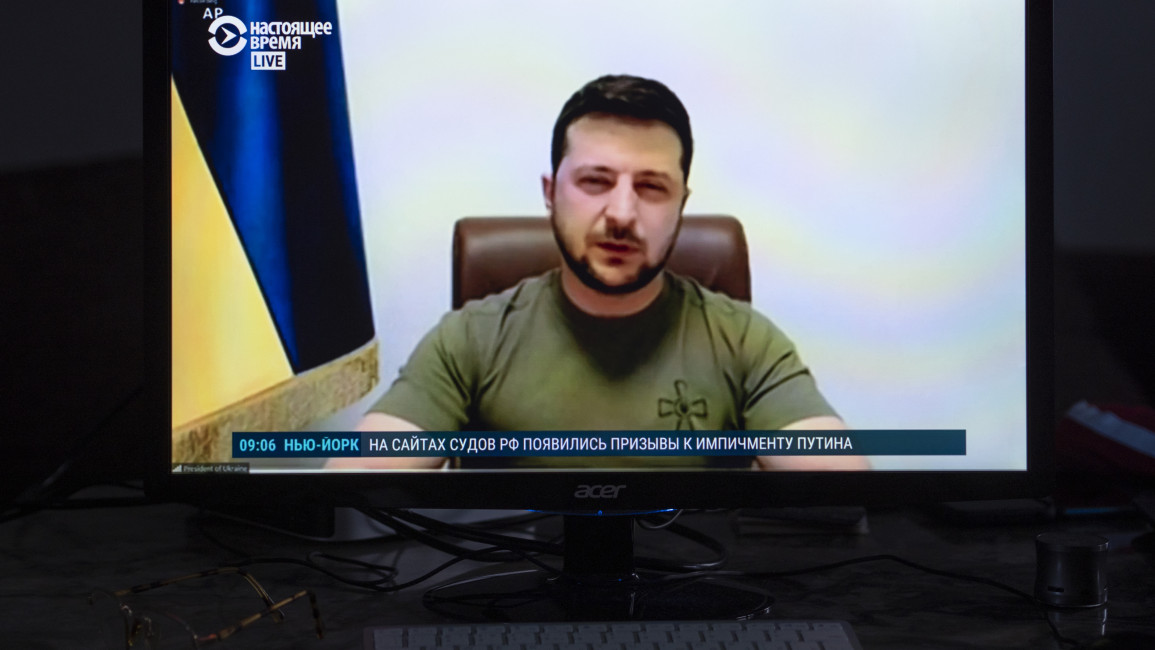Russia accused of deep fake video showing Zelensky ordering Ukrainian troops to surrender
A manipulated video of Ukrainian President Volodymyr Zelensky calling on his soldiers to surrender is being shared online, with Russian hackers thought to be responsible.
The deep fake video shows Zelensky asking Ukrainians to "lay down their arms" and was uploaded to the hacked Ukraine 24 TV channel, according to Shayan Sardarizadeh, a journalist who works on the spread of disinformation at BBC Monitoring.
It's day 21 of Russia-Ukraine war.
— Shayan Sardarizadeh (@Shayan86) March 16, 2022
A terrible deepfake of President Zelensky calling on Ukrainian troops to lay down their arms has been uploaded to the hacked website of Ukraine's 24 TV channel.
Not only is it so cheaply made, but Mr Zelensky sounds Russian in it! pic.twitter.com/sZCWzlYAQm
Deepfake videos are doctored with artificial intelligence to create convincing video and audio hoaxes showing individuals making statements they didn't actually say.
The Zelensky video has been viewed hundreds of thousands of times on Twitter.
Zelensky has reportedly responded to the manipulated video, saying: "If I can offer someone to lay down their arms, it's the Russian military. Go home. Because we're home. We are defending our land, our children & our families."
#Ukraine Hackers published a deep fake of @ZelenskyyUa urging citizens to lay down their arms. He responded immediately:
— Hanna Liubakova (@HannaLiubakova) March 16, 2022
"If I can offer someone to lay down their arms, it's the Russian military.Go home.Because we're home. We are defending our land, our children & our families." pic.twitter.com/TiICf3Z5Te
"This is the first deepfake that we've seen used in an intentional and broadly deceptive way," Sam Gregory, programme director at Witness, a human rights and technology group, told Euronews.
"It's not an effective deepfake, partly because it's not an extremely well-made deepfake, but also because Ukraine has done a masterful job pre-bunking and then swiftly rebutting the video," he added.
The video comes days after Kyiv warned soldiers and civilians that Russia could use deepfakes or other technologies to spread misinformation to lower Ukrainian resolve.
Ukrainian authorities claimed that among the fake videos, hackers could make one of President Zelensky ordering troops to surrender to Russian forces.
Moscow is known for using digital technologies to spread disinformation and falsehood in order to sow chaos among its rivals. During its invasion of Ukraine, a series of videos emerged on social media allegedly showing "killings" and "provocations" by Ukrainians in an attempt to justify its invasion of the country.
Most famously, the Kremlin is accused of interfering in the 2016 US Presidential Election with the goal of harming the campaign of Hilary Clinton in favour of Donald Trump, who was seen as soft on Russia.
Trump, who became president, was repeatedly accused of a pro-Putin foreign policy to the detriment of US interests.
Russia's brutal invasion of Ukraine, launched on 24 February, has killed thousands of civilians and forced more than 2 million to flee their homes, according to the UN.



